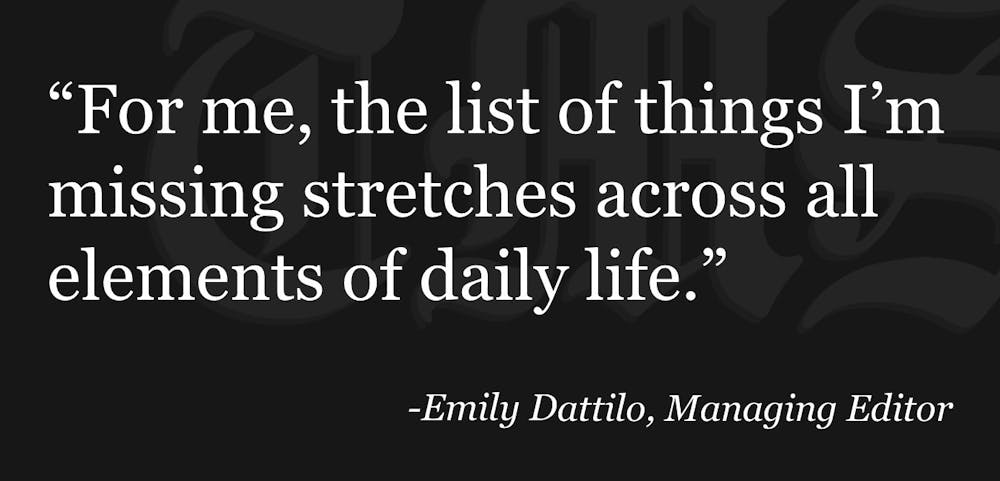I’ve spent a lot of time since March forcing myself to focus on the day in front of me. I’ve worried that letting my thoughts tiptoe toward the uncertain future will lead to anxiety and tension, so I don’t think about it.
I don’t think about how my college graduation next May might be canceled. I don’t think about what this holiday season might look like. I don’t think about how I might not be able to hug my grandmother until 2021.
And while I’m busy avoiding thoughts about the future, my mind wanders to the past, to the present and all of the small moments in between. And in those small moments, I find this ever-present sense of loss, split into such miniscule pieces that they feel insignificant when compared to the unfathomable losses some people have dealt with during this pandemic.
This insignificance can melt into guilt and embarrassment, as some of us may feel we have no right to mourn the little traditions and pleasures that no longer dot our days. If you’re like me, perhaps you pushed the memory of those small occurrences away and tried to forget about them.
I’d like to argue that we shouldn’t do so.
I’d like to argue that we should allow ourselves a moment or two a day to acknowledge and validate what we’re missing, no matter how trivial it seems. These few moments of catharsis have the ability to alter the arc of our day, allowing us to express subconscious frustration that might otherwise have distracted us from work or school.
For me, the list of things I’m missing stretches across all elements of daily life.
I miss randomly running into friends on campus, passing them on the sidewalks on the way to class. I miss spontaneous conversations with classmates and co-workers. I miss not being afraid of sitting down in restaurants. I miss not living in continual anxiety that I’ll contract the virus or give it to a loved one. I miss traveling. I miss seeing people’s facial expressions in real time, without lags or faulty Wi-Fi.
(Obviously, nothing I’m mentioning is of paramount importance, but shoving these thoughts aside isn’t healthy for any of us. Denying these frustrations doesn’t make them go away.)
The list of what we’re missing looks different for everyone, and it should. We all lead different lives, surrounded by different people, located in different environments. And yet despite all of those differences, I’d guess you can probably relate to the following anecdote.
I was on a Zoom call for my media and culture class. Not a single person in the class had their camera turned on. The professor spoke to a grid of blank squares — void of faces or emotion. Toward the end of class, he sent us into breakout rooms on Zoom, asking us to turn on our cameras to encourage conversation.
Sometimes, in breakout rooms, nobody talks, and it’s inexplicably awkward. Yet this time, all five of us turned on our cameras. Suddenly, blank boxes morphed into people, and a somewhat-buried need began to emerge — the need to converse, learn and collaborate with others. That same need appeared to emerge within all of my group members.
Enjoy what you're reading?
Signup for our newsletter
Within a moment, we were all talking and sharing ideas. We briefly talked about the assignment questions, but the conversation quickly turned to “Zoom fatigue,” to the class itself and the difficulties of remote learning. One boy in my group emphasized the importance of establishing a routine and sticking to it — if he didn’t, he’d have missed this class and slept the entire day, he added.
Class ended at 1 p.m., but our group kept talking beyond that. We likely would have chatted longer had the professor not told us to return back to the main session.
That brief breakout room conversation shook me out of the Zoom-call-passiveness I’d slipped into as countless days slid by, each looking like the one before. I didn’t want to lose that moment.
That experience reminded me of how much I miss those pre-pandemic days. I miss sitting in a classroom surrounded by real faces, not virtual ones, and laughing at the silly jokes my professors told in class. I want the feeling of planning my days, leaving time to walk from class to class, as opposed to flipping my computer open and clicking a button. I miss those days because they forced me to expect more of myself and the world around me.
And despite all the complexities of the current situation, as I mentioned earlier, the fix to all of this missing seems to be quite simple.
Allowing ourselves to.




